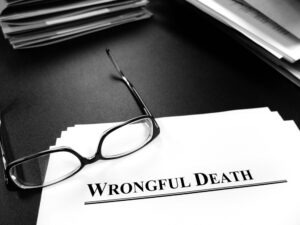
Indiana allows family members contending with a loved one’s wrongful death to pursue wrongful death claims against the bad actors involved in their cases. Your right to action is referred to as the “remedy” available to you. If you pursue a remedy, you may recover damages based on the economic and non-economic losses your family sustained due to a loved one’s death.
Our experienced wrongful death lawyers in Indianapolis can break down what remedies in Indiana’s wrongful death statutes may allow you to take legal action against a bad actor. We can go on to represent your best interests as your case evolves.
Breaking Down Indiana’s General Wrongful Death Act
The first remedy available to Indiana’s families under the state’s wrongful death statutes is the one outlined in Indiana’s General Wrongful Death Act. This act ensures that Indianapolis personal injury lawyers can collaborate with a victim’s remaining family members after a fatal accident.
Approved family members, including the deceased’s spouse, children, and dependent next of kin, may pursue damages based on economic and non-economic losses sustained due to someone else’s negligence. The non-economic damages you include in your request for support may cover loss of love and affection.
This remedy is the broadest of the wrongful death statutes in Indiana. That said, anyone who wants to act under Indiana’s General Wrongful Death Act must still bring forward enough evidence to meet or exceed Indiana’s burden of proving, tying someone else’s negligence to a loved one’s tragic passing.
Your Case Will Get
The Attention It Deserves

What You Need to Know About Indiana’s Child Wrongful Death Act
How are families supposed to get justice when someone else’s negligence causes the death of a child? If the child in question was 20 years old or younger, or 23 or younger and in college, the child’s parents may work with a personal injury lawyer to bring a claim for damages forward in civil court.
Indiana’s Child Wrongful Death Act accounts for action available to a child’s married and divorced parents. Married parents may jointly pursue legal action against a bad actor. Divorced parents without joint custody of the deceased may receive damages divided based on the losses they sustained upon their child’s death.
The damages parents receive when pursuing a case on behalf of a deceased child may include the following:
- The cost of a funeral and burial
- Loss of a child’s love
- Loss of companionship
- Loss of a child’s services
- Healthcare expenses, including the cost of hospice care
- Coverage of a child’s debts
- Pain and suffering
- Emotional distress
- Therapy and counseling services
What You Need to Know About Indiana’s Adult Wrongful Death Act
There are instances wherein negligent behavior may result in the death of unmarried adults with no dependents. In these cases, anyone interested in pursuing a wrongful death claim on behalf of the deceased may refer to the Indiana Adult Wrongful Death Act. This act allows the state to appoint a personal representative on behalf of the deceased.
That personal representative may then demand that the party responsible for the deceased’s passing provide applicable parties with damages based on the deceased’s:
- Premortem hospital expenses
- Hospice fees
- Funeral and burial expenses
- Outstanding debts
- Legal fees
- Lost and non-recoverable income
Bad actors may also be responsible for providing appropriate parties with compensation based on their loss of companionship, loss of consortium, pain and suffering, and other non-economic losses. The state caps the value of non-economic damages at $300,000.
Anyone interested in benefiting from the damages won by the deceased’s personal representative must prove that they had an ongoing relationship with the deceased and that the deceased’s death will negatively impact their financial well-being.


How to File a Wrongful Death Claim
Once you better understand the remedies in Indiana’s wrongful death statutes, you can determine whether or not you have the right to take legal action against the bad actors involved in someone’s recent passing. You can meet with our Indianapolis personal injury lawyers to discuss:
- The specific circumstances that led to a loved one’s death
- What evidence of negligence you have readily available to you
- What evidence an investigation into a loved one’s death may reveal
- What damages you may recover when filing a wrongful death claim
As long as you can meet Indiana’s burden of proof, you can argue for your right to damages. You may not even have to go to trial to get the support you deserve. If a negligent party recognizes their role in your accident, you may negotiate for support. If you can’t meet a bad actor face-to-face, you may ask an attorney to intercede on your behalf.
Notably, you must file your claim within Indiana’s personal injury statute of limitations, which is outlined in IC 34-11-2-4. Barring certain exceptions, this statute requires you to act within two years of a loved one’s tragic passing.

When to Contact an Indianapolis Wrongful Death Lawyer
If you decide you want to learn more about the remedies in Indiana’s wrongful death statutes, we encourage you to book a free case consultation with our wrongful death lawyers. Our team works on contingency so that everyone can get the legal advice they need, regardless of their financial situation.
Let Experienced Attorneys Break Down Your Right to Legal Remedies After a Loved One’s Wrongful Death
We understand that you may not know what the remedies in Indiana’s wrongful death statutes are and how they benefit your family. Fortunately, our Indianapolis wrongful death attorneys can clarify your right to legal action during a free, no-obligation case evaluation after a loved one’s death.
At Vaughan & Vaughan, we don’t want to infringe on your right to grieve or force you into legal action against bad actors. Instead, we want you to explore your options for recompense.
Are you seeking justice for a loved one’s tragic passing? Let experienced lawyers advocate for you in and out of civil court.




